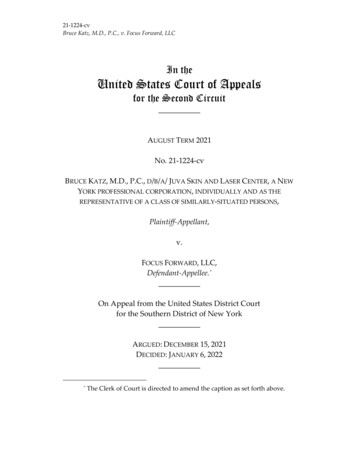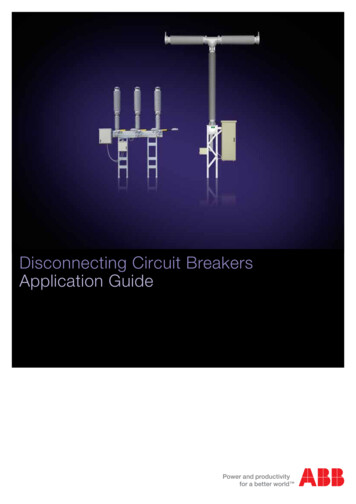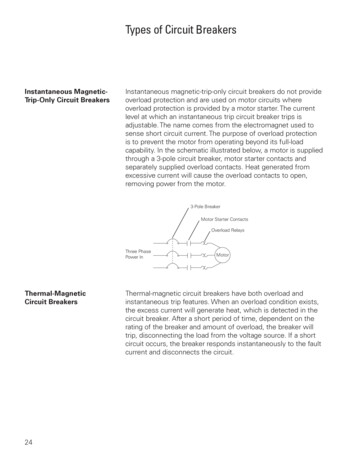
Transcription
21-1224-cvBruce Katz, M.D., P.C., v. Focus Forward, LLCIn theUnited States Court of Appealsfor the Second CircuitAUGUST TERM 2021No. 21-1224-cvBRUCE KATZ, M.D., P.C., D/B/A/ JUVA SKIN AND LASER CENTER, A NEWYORK PROFESSIONAL CORPORATION, INDIVIDUALLY AND AS THEREPRESENTATIVE OF A CLASS OF SIMILARLY-SITUATED PERSONS,Plaintiff-Appellant,v.FOCUS FORWARD, LLC,Defendant-Appellee. *On Appeal from the United States District Courtfor the Southern District of New YorkARGUED: DECEMBER 15, 2021DECIDED: JANUARY 6, 2022*The Clerk of Court is directed to amend the caption as set forth above.
Before: CABRANES, LOHIER, and LEE, Circuit Judges.Plaintiff Bruce Katz, M.D., P.C. appeals the April 6, 2021 orderand judgment of the United States District Court for the SouthernDistrict of New York (Paul A. Crotty, Judge) granting Defendant FocusForward, LLC’s motion to dismiss under Federal Rule of CivilProcedure 12(b)(6). This appeal presents the question of whether anunsolicited faxed invitation to participate in a market research surveyin exchange for money constitutes an “unsolicited advertisement”under the Telephone Consumer Protection Act of 1991 (the “TCPA”).Finding that it does not, we AFFIRM the order and judgment of theDistrict Court.GLENN L. HARA, Anderson Wanca, RollingMeadows, IL, for Plaintiff-Appellant.SAMANTHA L. SOUTHALL, BuchananIngersoll & Rooney PC, Philadelphia, PA,for Defendant-Appellee.PER CURIAM:The question presented is whether an unsolicited faxedinvitation to participate in a market research survey in exchange for2
money constitutes an “unsolicited advertisement” under theTelephone Consumer Protection Act of 1991 (the “TCPA”). Findingthat it does not, we AFFIRM the order and judgment of the DistrictCourt.I.BACKGROUNDBruce Katz, M.D., P.C. (“Plaintiff”) is a professional corporation,doing business as Juva Skin and Laser Center, that provides medicalservices. Focus Forward, LLC (“Defendant”) is a market researchcompany that conducts market surveys and receives payment from itsclients for providing them with the information it gathers. Plaintiff’scomplaint alleged that on or about September 12, 2019, and October25, 2019, Defendant sent Plaintiff two unsolicited faxes seekingparticipants in market research surveys, in violation of the TCPA, asamended by the Junk Fax Prevention Act of 2005 (the “JFPA”). 1The September 12 fax was addressed to the attention of “NursePractitioners,” and the October 25 fax was addressed to “Nurses &Physician Assistants.” Both faxes explained that Defendant was“currently conducting a market research study” and “offer[ed] anhonorarium of 150 for [the recipient’s] participation in a . . . telephoneinterview.” The faxes are reproduced as Appendix A and Appendix Bof this opinion.After Plaintiff filed a putative class action alleging violations ofthe TCPA and seeking both injunctive relief and statutory damages,1See 47 U.S.C. § 227(b)(1)(C).3
Defendant filed a motion to dismiss under Federal Rule of CivilProcedure 12(b)(6), arguing that an unsolicited faxed invitation toparticipate in a market research survey does not constitute an“unsolicited advertisement” under 47 U.S.C. § 227(b)(1)(C). TheDistrict Court agreed and granted the motion to dismiss.II.DISCUSSION“We review de novo a district court’s dismissal of a complaintpursuant to Rule 12(b)(6).” 2 In doing so, we “accept all factualallegations as true, and draw all reasonable inferences in the plaintiff’sfavor.” 3 Moreover, this appeal turns on the interpretation of whatconstitutes an “unsolicited advertisement” under the TCPA.“Interpretations of statutes are pure questions of law, and we thereforereview [them] de novo.” 4The TCPA as amended by the JFPA prohibits the use of “anytelephone facsimile machine, computer, or other device to send, to atelephone facsimile machine, an unsolicited advertisement.” 5 An“unsolicited advertisement” is defined by the statute as “any materialadvertising the commercial availability or quality of any property,2Austin v. Town of Farmington, 826 F.3d 622, 626 (2d Cir. 2016).3Id. at 625.United States v. Williams, 733 F.3d 448, 452 (2d Cir. 2013); see also MatthewN. Fulton, D.D.S., P.C. v. Enclarity, Inc., 962 F.3d 882, 890 (6th Cir. 2020) (“Whethera fax constitutes an unsolicited advertisement is a question of law.”).4547 U.S.C. § 227(b)(1)(C).4
goods, or services which is transmitted to any person without thatperson’s prior express invitation or permission.” 6 The regulations ofthe Federal Communications Commission (“FCC”) implementing theTCPA contain an identical definition of “unsolicited advertisement.” 7In 2006, the FCC also promulgated a rule (the “2006 Rule”) thatconstrues the TCPA as specifically proscribing any faxed surveys “thatserve as a pretext to an advertisement.” 8 In Physicians Healthsource, Inc.v. Boehringer Ingelheim Pharmaceuticals, Inc., 9 we recognized this type of“pretext liability” in a slightly different context. There, we held that anunsolicited fax promoting a free event could serve as a pretext for anadvertisement, but only where the event had “a commercial nexus toa firm’s business, i.e., its property, products, or services.” 10Whether a fax inviting the recipient to take a survey in exchangefor money constitutes an “advertisement” under the TCPA is a6Id. § 227(a)(5).“[U]nsolicited advertisement means any material advertising thecommercial availability or quality of any property, goods, or services . . . .” 47 C.F.R.§ 64.1200(f)(16); see also King v. Time Warner Cable Inc., 894 F.3d 473, 474 (2d Cir.2018) (“The FCC has the authority to promulgate regulations implementing theTCPA.”).7Rules and Regulations Implementing the Telephone Consumer ProtectionAct of 1991; Junk Fax Prevention Act of 2005, 71 Fed. Reg. 25967, 25973 (May 3,2006).89847 F.3d 92 (2d Cir. 2017).10Id. at 96.5
question that we have not answered explicitly before. 11 Confrontedwith this question in Fischbein v. Olson Research Group, 12 a split panel ofthe Third Circuit recently held that such faxes are advertisements,reasoning that “an offer of payment in exchange for participation in amarket survey is a commercial transaction, so a fax highlighting theavailability of that transaction is an advertisement under the TCPA.” 13Plaintiff urges us to adopt Fischbein’s reasoning and conclusion. 14Defendant relies on multiple district court decisions thatessentially hold the opposite. In Carolyn M. Machonis, O.T., PLLC v.Universal Survey Center, Inc., 15 a case with facts similar to those in thisappeal, the district court considered surveys faxed to “officemanagers” seeking their participation in a “[v]accines [s]tudy” andSee Joint App’x 28 (the District Court below noting that “[t]he SecondCircuit has yet to rule on this precise issue”); Carolyn M. Machonis, O.T., PLLC v.Universal Surv. Ctr., Inc., No. 18-CV-10978, 2020 WL 9815183, at *5 (S.D.N.Y. Feb.21, 2020) (Report and Recommendation) (“[N]either the Second Circuit nor anydistrict courts within the Circuit have specifically addressed whether or when anunsolicited faxed invitation to participate in a paid survey can constitute anunsolicited ‘advertisement’ under the TCPA, as amended by the JFPA andinterpreted by the FCC.”).1112959 F.3d 559 (3d Cir. 2020).Id. at 564; see also Lyngaas v. J. Reckner Assocs., Inc., No. 2:17-CV-12867(TGB), 2018 WL 3634309 (E.D. Mich. July 31, 2018) (reaching the same conclusion).1314Appellant’s Br. 2-3.No. 18-CV-10978, 2020 WL 9815183 (S.D.N.Y. Feb. 21, 2020) (Report andRecommendation).156
stating that they would “be compensated 100 for [their] time.” 16Magistrate Judge Debra Freeman examined the legislative history ofthe TCPA and the 2006 Rule and issued a Report andRecommendation concluding that “mere invitations to participate in asurvey, without more to render them a pretext for advertising, shouldnot themselves be viewed as prohibited advertisements under theTCPA.” 17 A number of other district courts outside this Circuit havearrived at the same conclusion. 18In the instant case, the District Court—relying on a number ofthese cases—concluded that “the bulk of authority faithful to thestatute’s text . . . hold[s] that the Faxes are not facially ‘advertisements’under the TCPA.” 1916Id. at *1 (internal quotation marks omitted).Id. at *5. Machonis settled before Judge Alison Nathan ruled on adoptingMagistrate Judge Freeman’s recommendation.17See, e.g., Exclusively Cats Veterinary Hosp., P.C. v. M/A/R/C Rsch., L.L.C., 444F. Supp. 3d 775, 780 (E.D. Mich. 2020) (“[T]he statutory and regulatory text of theTCPA demonstrates that surveys are not advertisements subject to liability.”);Podiatry in Motion, Inc. v. Interviewing Servs. of Am., LLC, No. 20-CV-3159, 2020 WL5909063, at *3 (N.D. Ill. Oct. 5, 2020); Phillips Randolph Enters., L.L.C. v. Adler-WeinerResearch Chi., Inc., 526 F. Supp. 2d 851, 853 (N.D. Ill. 2007). See also Robert W. Mauthe,M.D., P.C. v. Nat'l Imaging Assocs., Inc., No. 17-CV-1916, 2018 WL 1960945, at *2(E.D. Pa. Apr. 25, 2018) (fax asking recipient to “fill out a survey to facilitate theefficient use of the defendant’s . . . services” is not an advertisement), aff'd, 767 F.App’x 246 (3d Cir. 2019) (non-precedential opinion).1819Joint App’x 42.7
We agree. In interpreting the TCPA, “[w]e begin with thelanguage of the statute. If the statutory language is unambiguous, weconstrue the statute according to the plain meaning of its words.” 20According to the statute, “unsolicited advertisements” are only thosematerials “advertising the commercial availability or quality of anyproperty, goods, or services.” 21 Faxes that seek a recipient’sparticipation in a survey plainly do not advertise the availability advertisements” under the TCPA.Neither party in this case suggests the faxes advertise the“availability” of 150, and that this money is “property” under thestatute. This is for good reason. “The text’s plain meaning can best beunderstood by looking to the statutory scheme as a whole and placingthe particular provision within the context of that statute.” 22 The word“property” does not appear to include money as the word is used inthe TCPA. The word occurs twice: once in the definition of“unsolicited advertisement” and once in the definition of “telephonicsolicitation.” A “telephone solicitation” is defined as “a telephone callUnited States ex rel. Wood v. Allergan, Inc., 899 F.3d 163, 171 (2d Cir. 2018)(cleaned up).202147 U.S.C. § 227(a)(5).Saks v. Franklin Covey Co., 316 F.3d 337, 345 (2d Cir. 2003); see K MartCorp. v. Cartier, Inc., 486 U.S. 281, 291 (1988) (“In ascertaining the plain meaning ofthe statute, the court must look to the particular statutory language at issue, aswell as the language and design of the statute as a whole.”); see also Auburn Hous.Auth. v. Martinez, 277 F.3d 138, 144 (2d Cir. 2002) (“[T]he preferred meaning of astatutory provision is one that is consonant with the rest of the statute.”).228
or message for the purpose of encouraging the purchase or rental of, orinvestment in, property, goods, or services.” 23 It would be a strange forthe statute to speak of the “purchase or rental of, or investment in”money. And while it is true that the “unsolicited advertisement”definition might allow a broader reading of the word “property” thanthe “telephone solicitation” definition, “identical words used indifferent parts of the same statute are generally presumed to havethe same meaning.” 24A meaning of property that excludes the money that might beused to purchase other “property, goods, or services” also accordsmore naturally with the Congressional findings of the TCPA, whichnote the harms caused by the “use of the telephone to market goods andservices to the home and other businesses.” 25 The definitions of“telephone solicitation” and “unsolicited advertisement” should bothbe read in the context of these findings, which militate against defining“property” so expansively as to include offers of money toconsumers. 262347 U.S.C. § 227(a)(4) (emphasis added).24IBP, Inc. v. Alvarez, 546 U.S. 21, 34 (2005).Telephone Consumer Protection Act of 1991, Pub. L. No. 102-243, 105 Stat.2394, 2394 § 2 (1991).25The Fischbein majority and dissent agree on this point. See 959 F.3d at 562(“In considering whether the sender of a fax has an intent to buy ‘property, goods,or services’ available commercially, the term used in the TCPA . . . means theproperty, goods or services being bought or sold, not the money offered to buythem.”) and id. at 566 (Jordan, J., dissenting) (“[P]laintiffs argued at length that the269
The notion that such faxes might advertise the availability of a“service”—i.e., of the recipient’s participation in a survey 27—contortsthe ordinary meaning of the statute too far. The faxes seek thatparticipation from the fax recipient. The recipient may or may notparticipate—by definition, the fax sender does not know whether ornot that participation is available to her. 28 The faxes therefore cannotreasonably be construed as advertising the availability of such aservice.We disagree with the majority opinion in Fischbein on preciselythis point. That opinion relies on an encyclopedia definition of whatconstitutes a “commercial transaction” to argue that “an offer ofpayment . . . transforms the . . . market surveys into advertisements,”rather than focusing on the definition of “advertisement” that theterm ‘property’ in the TCPA includes money[.] . . . That reading strains the text tothe breaking point, and the Majority correctly rejects it.”).This is not to say that any communication that offers to pay the recipientmoney is thereby not an advertisement. One could imagine many examples ofcommunications, including faxed surveys, offering the recipient both money andservices, that might incur liability under the TCPA. Such communications are notbefore us, and as our holding makes clear, we are specifically addressed solely tofaxed invitations to participate in market research surveys in exchange for money.Cf. Appellant’s Br. at 11 (arguing that “the Faxes call a service desired tothe attention of the public and promote that service to be bought with profit as anaim,” and are therefore advertisements) (cleaned up).27“Available” means “capable of use for the accomplishment of a purpose:immediately utilizable.” See Webster’s Third New International Dictionary 150 (1976).2810
TCPA and FCC regulations provide. 29 In doing so, the opinion“effectively rewrit[es]” the statute to prohibit communications thatadvertise “the availability of an opportunity . . . to exchange goods orservices.” 30 But the statute does not prohibit communicationsadvertising the availability of such “an opportunity.” Nor does itprohibit communications advertising the availability of transactionsthat are “commercial in character,” as the Fischbein majority vertisingthe“availability . . . of any property, goods, or services.” 32 As the Fischbeindissenter explained, faxes seeking survey participation from arecipient “communicat[e] the exact opposite of availability—. . . stating a need for something not readily available to the sender.” 33Moreover, Defendant’s position that the faxes are notadvertisements finds persuasive support both in the legislative historyof the TCPA and in the FCC’s implementation of that law. 34 Before theJFPA extended the TCPA to include faxes, the House Committee on29See Fischbein, 959 F.3d at 562 (citing Encyclopedia Britannica).Id. at 565 (Jordan, J., dissenting) (quoting id. at 562 (majority opinion))(emphasis added).3031See id. at 562 (majority opinion).3247 U.S.C. § 227(a)(5) (emphasis added).33Fischbein, 959 F.3d at 566 (Jordan, J., dissenting).“[A]lthough we need not rely on legislative history because the statutorylanguage and scheme are clear, the legislative history also undercuts [Plaintiff’s]position.” Allergan, 899 F.3d at 174.3411
Energy and Commerce, in its recommendation that the TCPA beenacted, noted that “the Committee does not intend the term‘telephone solicitation’ to include public opinion polling, consumer ormarket surveys, or other survey research conducted by telephone,”and explained that “such research has generated relatively fewcomplaints” from consumers. 35 In regulations implementing the TCPAthe year after its enactment, the FCC excluded “research, marketsurveys, political polling or similar activities” from liability under thestatute. 36And as Machonis and other congruent district court opinionshave noted, even the FCC’s 2006 Rule itself—by creating liability for“any surveys that serve as a pretext to an advertisement”—impliesthat not all surveys are pretexts for advertisements, and that thereforenot all surveys are subject to liability under the TCPA. 37 Nothing about35H.R. Rep. No. 102-317, at *13 (1991). See Machonis, 2020 WL 9815183, at*4.In the Matter of Rules & Regulations Implementing the Telephone ConsumerProtection Act of 1991, 7 F.C.C. Rcd. 8752, 8774 (1992); see Exclusively Cats, 444 F.Supp. 3d at 782; see also Duran v. La Boom Disco, Inc., 955 F.3d 279, 286 n.21 (2d Cir.2020) (“We need not decide what degree of deference, if any, we owe to FCCOrders interpreting the TCPA . . . . Instead, we merely treat the FCC Orders aspersuasive authority, providing further confirmation for the interpretationthat . . . is commanded by the text of the statute.”), cert. granted, judgmentvacated, 141 S. Ct. 2509 (2021), and abrogated on other grounds by Facebook, Inc. v.Duguid, 141 S. Ct. 1163 (2021).36Machonis, 2020 WL 9815183, at *5; see also Exclusively Cats, 444 F. Supp. 3dat 782 (“[T]he FCC purposefully chose not to state that all surveys areadvertisements under the TCPA and explicitly narrowed its analysis to surveys3712
the surveys in the instant case suggest that they serve as a “pretext”for some other advertisement, and Plaintiff neither pleaded that theydo, nor argues as much on appeal. 38In sum, the statutory text, legislative history, and FCCimplementation of the TCPA all support the conclusion thatinvitations to participate in a survey, without more, are notadvertisements under the statute.III. CONCLUSIONTo summarize, we hold that a faxed invitation to participate ina market research survey in exchange for money does not constitutean “advertisement” under the TCPA.We have reviewed all of the arguments raised by Plaintiff onappeal and find them to be without merit. For the foregoing reasons,we AFFIRM the April 6, 2021 order and judgment of the DistrictCourt.sitting in for commercial offers. Implicit in the FCC's analysis is the assumptionthat surveys generally are not advertisements under the TCPA.”).We do not require that Plaintiffs “plead specific facts alleging thatspecific products or services would be, or were, promoted,” just as we did not doso in the free-event context. See Physicians Healthsource, 847 F.3d at 96. We agree,however, with the District Court that upon review of the actual faxes at issuehere, Plaintiff is left with “no basis for claiming pretext.” Joint App’x 43. See Rothv. Jennings, 489 F.3d 499, 509 (2d Cir. 2007) (“Documents that are attached to thecomplaint or incorporated in it by reference are deemed part of the pleading andmay be considered.”).3813
APPENDIX A14
APPENDIX B15
see 6 also King v. Time Warner Cable Inc., 894 F.3d 473, 474 (2d Cir. 2018) ("The FCC has the authority to promulgate regulations implementing the TCPA."). 8. Rules and Regulations Implementing the Telephone Consumer Protection Act of 1991; Junk Fax Prevention Act of 2005, 25967, 71 Fed. Reg. 25973 (May 3, 2006). 9. 847 F.3d 92 (2d Cir .











